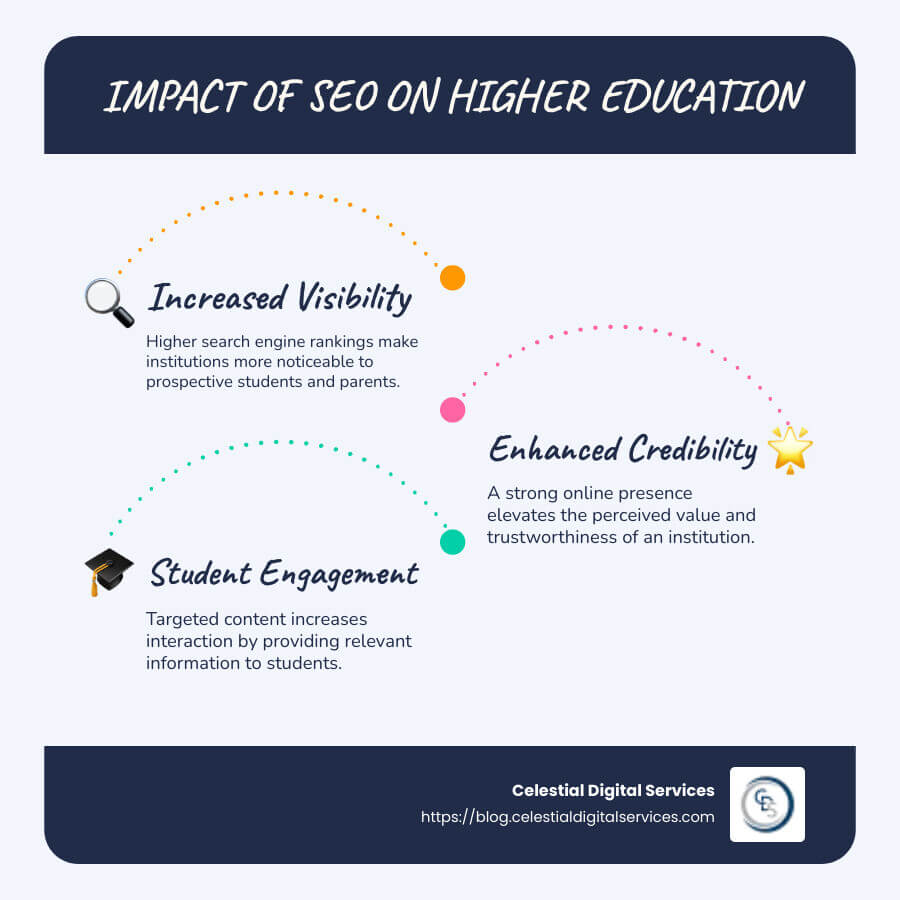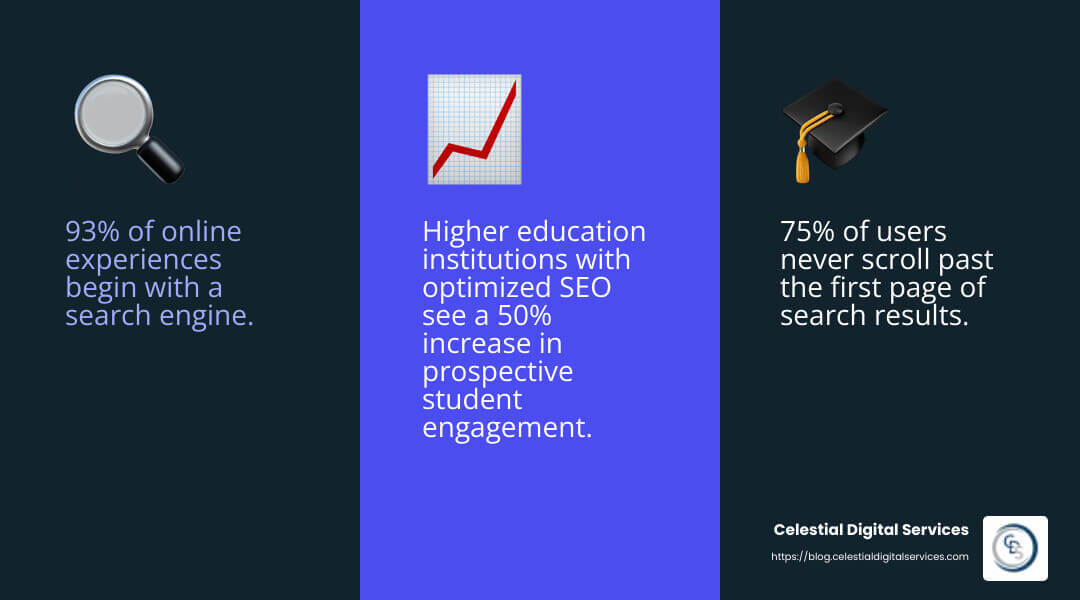In today’s digital world, educational institutions must harness the power of seo for higher education to stand out. This strategy helps schools improve their online presence and attract new students by making sure their websites are easily found on search engines. Here’s a quick snapshot of its impact:
- Increased Visibility: By optimizing for search engines, colleges and universities rank higher in search results, making them more noticeable to potential students and parents.
- Improved Credibility: A strong online presence can lift the perceived value of an institution.
- Student Engagement: Effective SEO can boost engagement by providing targeted, relevant content.
Using these insights, institutions can build a robust online strategy custom to the needs of tech-savvy students who rely heavily on digital platforms for educational information. Accept these techniques to lift your institution’s visibility and establish a compelling digital footprint.
With over a decade of experience in digital marketing and a passion for revolutionizing seo for higher education, I specialize in strategies that improve online presence and customer engagement. This expertise allows me to guide institutions in adapting to evolving digital landscapes, ensuring their offerings meet current student needs.

Understanding SEO for Higher Education
SEO for higher education is more than just a buzzword—it’s a necessity. Colleges and universities need to ensure they are visible to prospective students who are increasingly using search engines to research their educational options.
Visibility Matters
Visibility is the cornerstone of effective SEO. When your institution’s website ranks high on search engine results pages (SERPs), it becomes more noticeable to potential students. This increased visibility is crucial because students often start their college search online.
For example, optimizing for keywords like “best engineering programs” can put your institution in front of students actively searching for such programs. This is not just about being found; it’s about being found by the right people.
Search Engine Results and Credibility
A higher ranking in search engine results doesn’t just increase visibility—it also improves credibility. Websites that appear at the top of search results are often seen as more trustworthy. This perception can significantly influence a student’s decision to apply.
According to research, users tend to trust and click on the first few search results. By leveraging SEO strategies, institutions can position themselves as authoritative sources of information, which can lead to increased interest and applications.

Attracting Prospective Students
SEO isn’t just about attracting any traffic; it’s about attracting the right traffic. By targeting specific keywords and phrases, institutions can reach students who are actively looking for their specific programs or offerings.
For instance, if a university offers a unique marine biology program, optimizing content around related keywords can draw in students interested in that field. This targeted approach ensures that the traffic coming to the site is more likely to convert into applications and, ultimately, enrollments.
In conclusion, understanding and applying SEO for higher education is essential for institutions aiming to increase their online visibility, credibility, and student engagement. By doing so, they can effectively reach and attract prospective students in an increasingly competitive digital landscape.
Next, let’s dig into the key components that make up a successful SEO strategy for higher education.
Key Components of SEO for Higher Education
To thrive in the digital landscape, higher education institutions must focus on several critical components of SEO. These elements work together to boost visibility, improve credibility, and attract prospective students.
On-Page SEO
On-page SEO involves optimizing individual web pages to improve search rankings and draw in relevant traffic. Key aspects include:
- Keywords: Integrate relevant keywords naturally into titles, headings, and content. This helps search engines understand the page’s topic.
- Meta Descriptions: Craft compelling meta descriptions that summarize the page content and encourage clicks.
- Headers: Use headers (H1, H2, etc.) to organize content and make it more readable. This structure aids both users and search engines.
For example, incorporating keywords like “affordable online MBA programs” within a page’s content and metadata can help attract students searching for budget-friendly online degrees.
Off-Page SEO
Off-page SEO focuses on activities outside your website that impact your ranking. This includes:
- Backlinks: Earn links from reputable sources, such as educational sites and government pages, to boost credibility.
- Social Media: Engage with students and alumni on platforms like Twitter and Facebook to increase brand visibility.
A case study on American University showed how social media engagement led to increased interaction with prospective students and alumni. By actively participating in these spaces, the university improved its online presence and credibility.
Content Quality
High-quality content is the backbone of any successful SEO strategy. It should be:
- Informative: Provide valuable information that answers prospective students’ questions.
- Engaging: Use multimedia content like videos and images to capture attention and improve engagement.
A great example is Michigan State University’s use of informative content to showcase campus life and academic programs. This approach not only helps with SEO but also engages prospective students by providing a glimpse into the university experience.
User Experience
User experience (UX) is crucial for retaining visitors and improving SEO rankings. Focus on:
- Page Speed: Ensure fast loading times to prevent user frustration and site abandonment.
- Mobile Responsiveness: Optimize for mobile devices since many students use smartphones for research.
- Intuitive Navigation: Create a user-friendly site structure that allows easy access to information.
Consider the Wu Executive Academy’s site, which offers an organized layout where users can quickly find resources. This kind of UX reduces bounce rates and encourages users to explore further, signaling to search engines that the website is a valuable resource.
Incorporating these key components into your SEO strategy can significantly lift your institution’s online presence and effectiveness in attracting prospective students. Next, we’ll explore advanced strategies to further improve your SEO efforts.
Advanced Strategies for Higher Education SEO
As we dive deeper into SEO for higher education, explore advanced strategies that leverage modern technologies and trends. These tactics can help institutions stand out in a competitive digital landscape. Let’s explore how AI tools, voice search, video SEO, and local SEO can transform your online presence.
AI Tools
AI tools are revolutionizing the way educational institutions approach SEO. These tools can automate and optimize various aspects of your SEO strategy, making it more efficient and effective.
- Content Optimization: Tools like HubSpot AI can help create content that ranks higher by analyzing search patterns and suggesting improvements.
- Keyword Research: SEO AI tools assist in identifying high-impact keywords that align with search trends, ensuring content reaches the right audience.
- SERP Analysis: Real-time analysis of search engine results pages (SERPs) helps tailor strategies to meet current demands.
Voice Search
With the rise of voice-activated assistants like Alexa and Siri, optimizing for voice search is crucial. Voice queries are often longer and more conversational than traditional text searches.
- Long-Tail Keywords: Focus on integrating long-tail keywords that mimic natural language and question-based queries.
- Conversational Content: Create content that answers common questions prospective students might ask. This can improve your chances of appearing in voice search results.
Video SEO
Video content is becoming increasingly important for engaging potential students. However, creating videos is just the start; they must be optimized for search engines.
- Keyword-Rich Titles and Descriptions: Ensure your videos have descriptive titles and metadata to improve search visibility.
- SEO-Friendly Hosting: Choose platforms like YouTube that improve your SEO efforts. Embedding videos on your site can improve user engagement metrics.
An example from the University of Michigan shows how a video tour with optimized metadata can attract students by providing an immersive campus experience.
Local SEO
Local SEO is vital for institutions looking to connect with nearby students and communities.
- Google My Business: Optimize your profile to appear in local searches. Include accurate contact information and engaging descriptions.
- Local Content: Highlight local alumni success stories and community involvement to resonate with local searchers.
Consider John Cabot University, which optimized its Google My Business account to provide valuable information and improve findability for local students.
By implementing these advanced strategies, higher education institutions can significantly improve their SEO efforts, ensuring they remain competitive and visible in an changing digital world.
Top 6 SEO Strategies for Higher Education
In a rapidly evolving digital landscape, it’s crucial for educational institutions to stay ahead with cutting-edge SEO for higher education strategies. Let’s explore the top six strategies that can lift your institution’s online presence.
Keep Up With AI Innovations
AI is reshaping how we approach SEO, offering tools that streamline and improve your strategy.
- AI Tools: Use tools like AlliAi and Pro Rank Tracker to simplify keyword research and track rankings. These tools can help you stay on top of search trends and optimize your content for better visibility.
- Google Search Generative Experience: This advanced AI feature interprets search queries with context and nuance, emphasizing the need for content that answers questions clearly and concisely.

Accept Video SEO
Video content is a powerful way to engage potential students, but it must be optimized to be effective.
- Keyword-Rich Titles and Descriptions: Use relevant keywords in your video titles and descriptions to improve findability.
- Hosting Platforms: Platforms like YouTube are essential for video SEO. They not only improve visibility but also allow for embedding on your site, boosting engagement.
The University of Michigan’s video tours, for instance, effectively use optimized metadata to attract prospective students.
Optimize for Voice Search
With the rise of voice-activated devices, adapting to voice search is essential.
- Long-Tail Keywords: Voice searches often use natural, conversational language. Incorporate long-tail keywords that reflect how people speak.
- Conversational Queries: Develop content that answers specific questions your audience might ask, increasing your chances of being featured in voice search results.
Leverage Local SEO
Connecting with local communities can significantly impact your institution’s visibility.
- Google My Business: Keep your profile updated with accurate details and engaging content to appear in local searches.
- Local Citations: Highlight local success stories and community involvement to resonate with local searchers.
John Cabot University, for example, optimized its Google My Business account to improve its local findability.
Focus on Long-Form Content
Content that demonstrates authority and expertise is crucial for SEO success.
- E-E-A-T Principle: Ensure your content reflects expertise, experience, authoritativeness, and trustworthiness. This builds credibility with both search engines and users.
- Authority: Regularly produce well-researched articles and resources that establish your institution as a thought leader.
Improve Mobile-Friendliness and UX
A seamless user experience is key to retaining visitors and improving search rankings.
- Page Speed: Fast-loading pages improve user experience and are favored by search engines.
- Responsive Design: Ensure your website is mobile-friendly, as many users access information on their phones.
By implementing these strategies, educational institutions can not only improve their search engine rankings but also create a more engaging and informative online presence for prospective students.
Frequently Asked Questions about SEO for Higher Education
What is SEO in higher education?
SEO for higher education refers to the process of optimizing college and university websites to improve their visibility in search engine results. This involves using targeted keywords, creating high-quality educational content, and ensuring a seamless user experience. By doing so, institutions can attract prospective students, increase enrollment, and improve their credibility.
How can universities improve their SEO?
Universities can boost their SEO by focusing on several key areas:
-
Keyword Research: Identify and use specific terms that potential students are searching for. Tools like Google Keyword Planner can help find popular terms related to academic programs.
-
Content Quality: Create informative and engaging content that showcases your institution’s strengths. Highlight faculty achievements, campus life, and academic programs.
-
Technical SEO: Ensure your website is mobile-friendly, has fast page speeds, and is easy to steer.
-
Backlinks: Earn links from reputable sources, such as educational and government websites, to increase your site’s authority.
-
Local SEO: Optimize your Google My Business profile and use local keywords to attract students from specific regions.

Why is SEO important for colleges?
SEO is crucial for colleges because it directly impacts their ability to reach potential students. Here are some reasons why:
-
Increased Visibility: Higher rankings in search engine results make it easier for students to find your institution.
-
Higher Enrollment: By attracting more qualified visitors, colleges can increase applications and, ultimately, enrollments.
-
Credibility and Trust: Appearing at the top of search results improves the institution’s credibility, as users often trust these sites more.
-
Funding Opportunities: Improved visibility can attract more donations and funding from alumni and other sources, supporting the institution’s growth and development.
By implementing effective SEO strategies, colleges can significantly improve their online presence and remain competitive in the digital landscape.
Conclusion
Having a strong online presence is crucial for educational institutions. At Celestial Digital Services, we understand the unique challenges faced by colleges and universities in the online space. Our mission is to empower these institutions with innovative digital marketing strategies that improve their visibility and effectiveness.
SEO for higher education is more than just a tool—it’s a pathway to reaching prospective students and boosting enrollment. By optimizing your website with targeted keywords, creating engaging content, and ensuring a seamless user experience, your institution can stand out in search engine results. This not only attracts more students but also builds trust and credibility.
Our comprehensive services, including SEO, lead generation, and social media marketing, are designed to help educational institutions thrive. We focus on creating custom solutions that meet the specific needs of each client, ensuring that your institution remains competitive in the changing digital landscape.
For colleges looking to boost their online presence and attract more students, partnering with Celestial Digital Services can make a significant difference. We are committed to helping you achieve your goals with effective and innovative digital marketing strategies.
Explore our SEO services and see how we can lift your institution’s online presence.
By leveraging the right strategies, your institution can not only improve its visibility but also foster a deeper connection with prospective students, paving the way for sustained growth and success.



